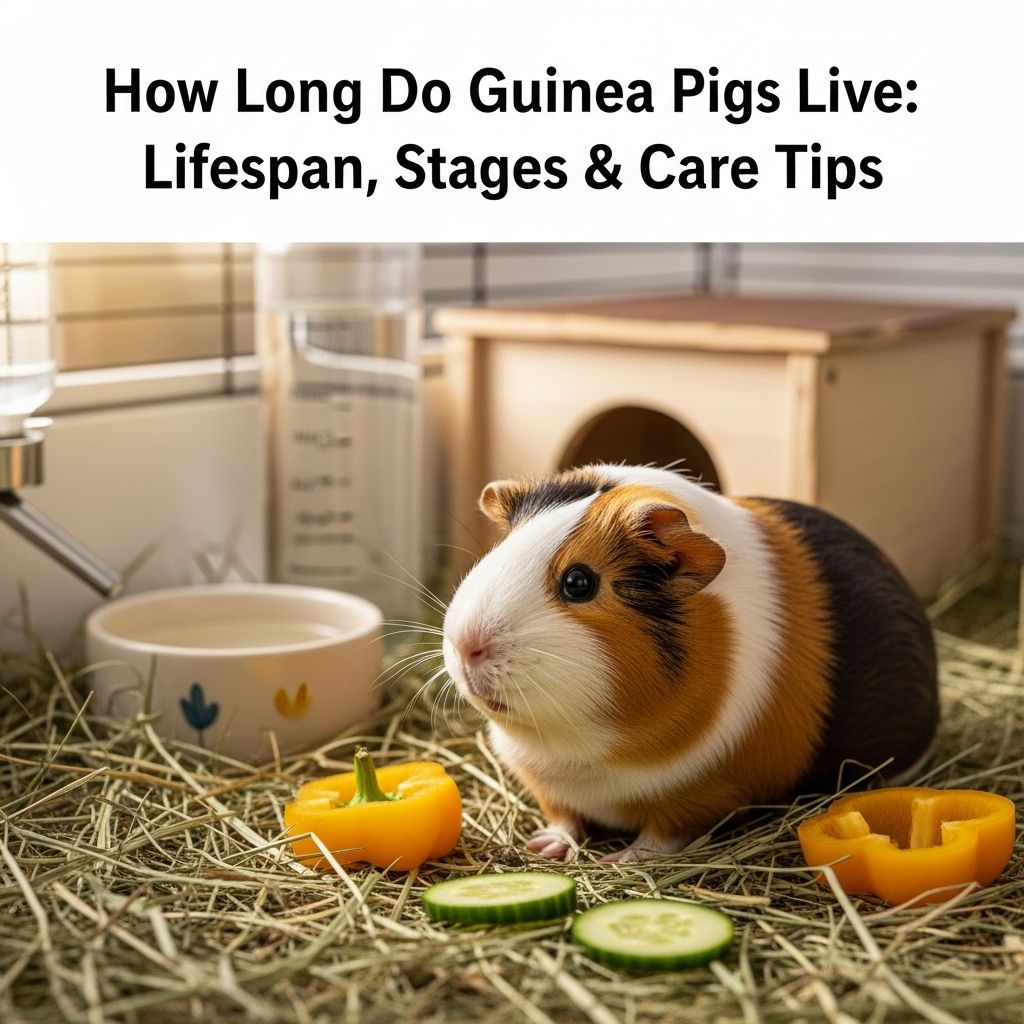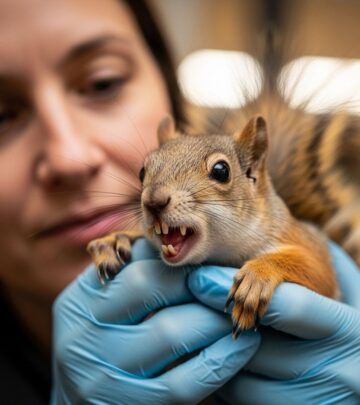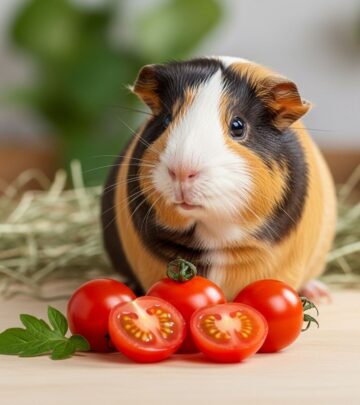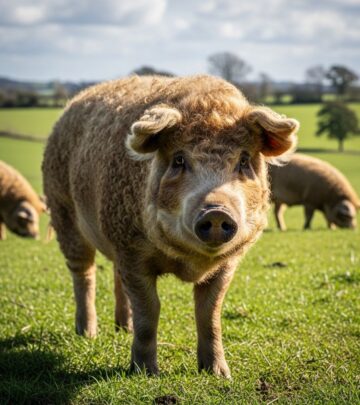How Long Do Guinea Pigs Live: Lifespan, Stages & Care Tips
Personalized nutrition and enrichment help guinea pigs thrive through every life phase.

How Long Do Guinea Pigs Live? Average Lifespan, Life Stages, and Optimal Care
Guinea pigs (Cavia porcellus) are beloved pets known for their gentle personalities, engaging vocalizations, and manageable care requirements. Understanding the average lifespan of a guinea pig, the stages they experience, and how to support their longevity is crucial for every current and prospective owner. This comprehensive guide covers the factors that influence guinea pig lifespan, how to identify and support each life stage, the essentials of proper care, and answers to the most frequently asked questions about these charming rodents.
Understanding the Average Lifespan of Guinea Pigs
Most pet guinea pigs live between five and seven years on average, although their lifespans can range from as little as four years to over eight years with exceptional care. Outliers under special circumstances have even exceeded these ranges, with the oldest recorded guinea pig living nearly 15 years.
| Environment | Average Lifespan | Maximum Documented Lifespan |
|---|---|---|
| Pet (Indoor) | 5–7 years | Up to 14 years, 10 months |
| Pet (General) | 4–8 years | Occasionally longer (rare cases: 12–15 years) |
| Wild | Up to 3 years | Rarely exceeds 3 years |
While some guinea pigs may fall outside these norms, the majority will enjoy between half a decade and nearly a decade of life when provided with proper nutrition, clean and stimulating environments, and regular health care.
Typical Life Stages of a Guinea Pig
Guinea pigs pass through several distinct life stages, each with unique behavioral and care requirements. Understanding these stages helps ensure your pet receives appropriate support at every age.
- Neonate/Pup (Birth to ~six weeks): Born fully furred, eyes open, able to eat solid food within days but still nurses from the mother. Rapid growth occurs during this phase.
- Juvenile/Adolescent (6 weeks to 6 months): Guinea pigs develop social behaviors and continue to grow. Sexual maturity occurs around 2 months for females and 3 months for males.
- Adult (6 months – 4+ years): The main phase of guinea pig life. Physical growth slows, and the guinea pig reaches full social and physical maturity. Lifespan during this stage varies based on genetics, care, and health.
- Senior (4+ years): Guinea pigs are considered seniors at about 4 or 5 years. You may notice decreased mobility, changes in appetite, and more frequent health concerns. Special care and increased vet visits may be required.
Table: Life Stages Overview
| Stage | Age Range | Key Characteristics |
|---|---|---|
| Neonate | 0–6 weeks | Rapid growth, dependent on mother, learns to eat solids |
| Juvenile | 6 weeks–6 months | Develops social bonds, matures sexually, learns from colony |
| Adult | 6 months–4+ years | Stable, social, established hierarchy, peak health |
| Senior | 4–8 years+ | Slower activity, may need support for age-related issues |
Factors That Influence Guinea Pig Lifespan
Multiple factors affect how long a guinea pig lives, ranging from genetic inheritance to how well it’s taken care of. Being aware of these factors helps you create an optimal environment for longevity.
- Genetics: Hereditary traits, including susceptibility to illness, can impact expected lifespan. Some breeds may be predisposed to certain health conditions.
- Diet: Proper nutrition is crucial. A diet based on high-quality grass hay, vegetables, and guinea pig-specific pellets prolongs life. Vitamin C supplementation is essential because guinea pigs cannot manufacture this vital nutrient themselves.
- Living Environment: Clean, spacious, and enriched habitats minimize stress and disease. Avoiding exposure to drafts and temperature extremes is also key.
- Enrichment: Mental and physical stimulation combats boredom and behavioral issues, contributing to a longer, healthier life.
- Preventative Care: Routine veterinary checkups, prompt attention to health changes, and basic grooming (nail trims, dental checks) are all part of good care.
Additional Factors Impacting Lifespan
- Companionship: Guinea pigs are social and benefit from living with other compatible pigs.
- Stress Reduction: Providing hiding places, consistent routines, and gentle handling reduce fear-related health problems.
- Breeding History: Pregnancies too early or late in life, or repeated breeding, may shorten lifespan for female guinea pigs.
How to Support a Long, Healthy Guinea Pig Life
There are specific steps every guinea pig owner can take to help their pet thrive throughout its natural lifetime.
Proper Diet
- Timothy or other grass hay: Should make up 80% of the guinea pig’s diet. Crucial for digestive and dental health.
- Pelleted food: Only feed pellets formulated specifically for guinea pigs. Avoid mixes with seeds, nuts, or colored bits.
- Fresh veggies: Leafy greens such as romaine, kale, bell peppers—offered daily in moderation.
- Vitamin C supplementation: Use supplements designed for guinea pigs, as they require dietary vitamin C.
- Fruit as treats: Very occasional and in tiny amounts due to sugar content.
Optimal Living Environment
- Enclosure: Spacious cage with solid base (minimum 7.5 square feet per guinea pig, more when possible).
- Bedding: Absorbent, dust-free material; replace frequently to prevent ammonia buildup.
- Hideaways: Provide at least one per guinea pig for security and stress reduction.
- Cleaning: Spot-clean daily, do a thorough cleaning weekly.
Daily Enrichment and Socialization
- Exercise: Offer daily out-of-cage time in a safe, guinea pig-proofed area.
- Toys: Chew toys, tunnels, and foraging activities help prevent boredom.
- Companionship: Most guinea pigs thrive in pairs or small groups of the same sex.
Preventive Health Care
- Veterinary checks: Annual exams, or more frequently for seniors or if health concerns arise.
- Teeth: Regularly check for overgrowth; provide safe wood or hay to encourage normal chewing.
- Grooming: Some breeds need brushing; all need periodic nail trims and monitoring for skin issues.
Common Health Issues That May Affect Lifespan
Awareness and prompt treatment of common guinea pig health problems can extend both the length and quality of your pet’s life.
- Dental disease: Malocclusion requires prompt vet intervention.
- Respiratory infections: Guinea pigs are susceptible to pneumonia and upper respiratory infections, which can be severe if untreated.
- Scurvy: A vitamin C deficiency, causing lethargy, painful joints, and poor appetite.
- Pododermatitis: (Bumblefoot) A painful foot condition from unsanitary bedding or obesity.
- Urinary stones: Can cause infection and pain; monitor for blood in urine or straining to urinate.
- Parasites: Mites, lice, and fungal skin infections can cause itching, hair loss, and discomfort.
Caring for Senior Guinea Pigs
After age four, guinea pigs are considered seniors and often need extra attention. Early detection of age-related illness through regular checkups is vital. Consider the following adjustments:
- Ensure bedding is extra soft to comfort aging joints
- Offer easier access to food and water
- Monitor weight and appetite closely
- Increase vet visit frequency for preventative evaluation
- Be especially gentle during handling and grooming
Making the Most of Your Guinea Pig’s Life
Providing a stimulating, safe, and loving environment, along with attentive care tailored to your guinea pig’s stage of life, will help your companion experience a full and happy lifespan. Observing changes in behavior or health—and seeking veterinary advice if needed—can make a significant difference in longevity and quality of life.
Frequently Asked Questions (FAQs)
What is the average lifespan of a pet guinea pig?
The average lifespan of a pet guinea pig is between five and seven years, although some individuals can live longer with exceptional care.
What breed of guinea pig lives the longest?
There is no scientifically proven ‘longest-living breed,’ but guinea pigs with fewer inherited health issues and those kept as indoor pets often live slightly longer. Good genes and excellent care are more influential than breed.
Do wild guinea pigs live as long as domestic pets?
Wild guinea pigs typically live much shorter lives, generally under three years, due to predators, food scarcity, disease, and environmental hazards.
How can I lengthen my guinea pig’s life?
Best practices include providing a balanced diet with vitamin C, daily exercise and enrichment, regular grooming, prompt veterinary care when ill, and a clean, spacious, and safe environment.
How can I tell if my guinea pig is becoming a senior?
Signs include graying fur, decreased energy, weight changes, thicker nails, and sometimes cloudiness of the eyes. Senior guinea pigs usually need gentler care and more frequent vet exams.
Do guinea pigs need vaccinations?
No, guinea pigs do not require routine vaccinations, but annual veterinary checkups are strongly recommended.
What are signs my guinea pig may be sick?
Common signs include lethargy, loss of appetite, labored breathing, sneezing or coughing, diarrhea, and dramatic weight loss. Immediate veterinary attention is essential for any guinea pig showing these symptoms.
Can a guinea pig live alone?
While it is possible, guinea pigs are very social and typically thrive best with another gentle guinea pig as a companion. Always introduce new companions gradually to prevent stress or fighting.
What can I do to enrich my guinea pig’s life?
Provide toys, cardboard tubes, tunnels, clean but interesting bedding, and daily interaction. Rotate enrichment items regularly to prevent boredom.
Summary Table: Guinea Pig Lifespan at a Glance
| Setting | Lifespan Range | Notes |
|---|---|---|
| Pet (Indoor) | 5–7 years (up to 8+ possible) | Most common scenario, best longevity with attentive care |
| Wild Guinea Pig | Up to 3 years | Shorter due to predation and environmental risks |
| Longest-Lived on Record | 14 years, 10 months | Extremely rare and exceptional |
Explore More About Guinea Pigs
If you’re thinking about bringing a guinea pig into your home or want to ensure your current pet enjoys a healthy, fulfilling life, understanding their unique needs—and the factors that influence their lifespan—puts you on the path to a joyful companionship for many years.
References
Read full bio of medha deb












